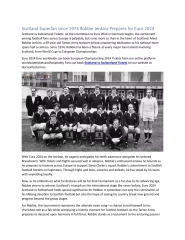Reforming the Euro Area: Where We Stand on Economic Integration and Policy Principles
This presentation delves into the current status of reform efforts within the Euro area, focusing on economic resilience, growth potential, legacy debt issues, and the challenges of integrating policy principles. It explores disagreements between French and German economists on fiscal stances and emphasizes the need for agreement on key policy principles for sustainable progress.
Download Presentation

Please find below an Image/Link to download the presentation.
The content on the website is provided AS IS for your information and personal use only. It may not be sold, licensed, or shared on other websites without obtaining consent from the author.If you encounter any issues during the download, it is possible that the publisher has removed the file from their server.
You are allowed to download the files provided on this website for personal or commercial use, subject to the condition that they are used lawfully. All files are the property of their respective owners.
The content on the website is provided AS IS for your information and personal use only. It may not be sold, licensed, or shared on other websites without obtaining consent from the author.
E N D
Presentation Transcript
Reforming the euro area: Where do we stand Jean Pisani-Ferry* CEPII-CESifo-DIW-OFCE conference Paris, 8 July 2016 * Hertie School, Berlin, and France Strat gie, Paris DATE / 00/00/2014 Titre de la pr sentation 1
Time to get serious (again) Brexit Economic risk Political risk Market risk On the agenda Economic revival Economics of currency union Politics of monetary integration DATE / 00/00/2014 Titre de la pr sentation 2
What problems? Infrastructure Integration within European market Economic resilience Growth potential Legacy Debt Banks Real exchange rates Unemployment Policy principles Supply / demand Individual responsibility / risk sharing Governance model DATE / 00/00/2014 Titre de la pr sentation 3
Where / why do we disagree? Not fundamentally on infrastructure Domestic agenda and EMU agenda largely coincide Issues to be solved: Integration (pan-European banks; labour mobility) Reform commitment A lot on legacy issues Creditors vs. debtors Skeletons in the cupboard Question: can we find agreement on policy principles? Cognitive dissonance (alternative crisis models) Preference heterogeneity Compatibility with domestic political systems 5P report: the wrong strategy Rather: blueprint first, then address legacy issues DATE / 00/00/2014 Titre de la pr sentation 4
Supply / demand: an economists dispute French and German economists argue at length over the appropriate fiscal stance In reality: French fiscal policy not that stabilising (especially bad at consolidating in good times) German fiscal policy not that procyclical (especially good at consolidating in good times) Implications: Do not overestimate practical importance of differences in policy philosophy Room for agreement on policy principles DATE / 00/00/2014 Titre de la pr sentation 5
Fiscal stabilisation in France, 1996-2015: 15/45 3 Consolidation during recession 30 % Consolidation in good times 10% 2 1996 2011 1 2013 2012 Fiscal stance 1998 2005 2008 2014 2006 1999 2003 1 2015 1997 0 2004 2010 -3 -2 -1 0 2 3 2001 2000 2007 acyclical fiscal policy: 40 % -1 2002 2009 -2 Stimulus in good times: 15 % Stimulus during recession: 5 % -3 Output gap DATE / 00/00/2014 Titre de la pr sentation 6
Fiscal stabilisation in Germany, 1996-2015: 30/55 3 Consolidation in recession: 45 % Consolidation in good times : 25 % 2 2000 2011 1 2012 2007 2003 1999 2013 Fiscal stance 2005 2006 2004 2009 1997 1998 2014 0 2015 1996 0 2002 -5 -4 -3 -2 -1 1 2008 2 3 4 5 acyclical fiscal policy : 15 % -1 2001 -2 2010 Stimulus in recession: 5 % Stimulus in good times : 10 % -3 output gap DATE / 00/00/2014 Titre de la pr sentation 7
Individual responsibility / risk sharing: Room for (good) compromise German view emphasises moral hazard, adverse effects of bail-outs French view emphasises solidarity as a quid pro quo for discipline Key in discussions on: Fiscal regime Banking union Reforms A balanced compromise: Debt restructuring scheme based on ESM Full banking union with deposit guarantee and fiscal backstop Common safe asset Fiscal discipline rules DATE / 00/00/2014 Titre de la pr sentation 8
Governance model: Room for triangulation French view emphasises discretion and coordination German view emphasises rules and competence delineation Both often inconsistent: F reluctant to rules-based coordination G reluctant to delegation to EZ level Result: messy, ineffective and illegitimate governance In reality three possible models: a) Full decentralisation and market discipline ( la Ashok Mody) b) Common targets + coordination (e.g. Villeroy s MOF) c) Federalisation and common institutions (EZ budget) Problem: hard to compromise between (a) and (b) but F and G reluctant to (c) Room for clever triangulation? Hub and spoke model for national fiscal policies: strong common institutions, strong national institutions (fiscal councils, productivity councils) Limited fiscal capacity at EZ level for spending on common public goods and contingent aggregate stabilisation DATE / 00/00/2014 Titre de la pr sentation 9
Thoughts on legacy issues Significant efforts to address legacy issues without fiscal transfers (see e.g. recent CEPR report) Useful attempts but do not design the permanent regime with a view on addressing legacy problems Better pay one-off price for legacy than accept permanent design flaw DATE / 00/00/2014 Titre de la pr sentation 10























